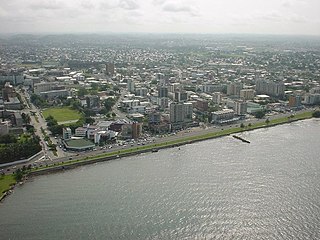Little is known of the history of Gabon prior to European contact. Bantu migrants settled the area beginning in the 14th century. Portuguese explorers and traders arrived in the area in the late 15th century. The coast subsequently became a center of the slave trade with Dutch, English, and French traders arriving in the 16th century. In 1839 and 1841, France established a protectorate over the coast.

Gabon enjoys a per capita income four times that of most nations of sub-Saharan Africa, its reliance on resource extraction industry releasing much of the population from extreme poverty.

Libreville is the capital and largest city of Gabon, in western central Africa. The city is a port on the Komo River, near the Gulf of Guinea, and a trade center for a timber region. As of 2013, its census population was 703,904. The area was originally inhabited by the Mpongwé tribe before the French acquired the land in 1839. In 1846, a Brazilian slave ship was captured by the French navy assisting the British Blockade of Africa, and fifty-two of the freed slaves were resettled on the site. It became the chief port of French Equatorial Africa from 1934 to 1946, and was the central focus of the Battle of Gabon in 1940. Libreville was named in imitation of Freetown, and grew slowly as a trading post and a minor administrative centre, reaching a population of 32,000 on independence in 1960. Since independence, the city has grown rapidly and now houses nearly half the national population. It is home to a shipbuilding industry, brewing industry, and sawmills, and exports raw materials such as wood, rubber and cocoa.

El Hadj Omar Bongo Ondimba was a Gabonese dictator under French control who was President of Gabon for 42 years, from 1967 until his death in 2009. Omar Bongo was promoted to key positions as a young official under Gabon's first President Léon M'ba in the 1960s, before being elected Vice-President in his own right in 1966. In 1967, he succeeded M'ba to become the second Gabon President, upon the latter's death.

The Gabon national football team, nicknamed Les Panthères or Les Brésiliens, is the national team of Gabon and is controlled by the Gabonese Football Federation. They have never qualified for the World Cup, but have qualified seven times for the Africa Cup of Nations.

Ali Bongo Ondimba, sometimes known as Ali Bongo, is a Gabonese leader who has been President of Gabon since October 2009.

The National Assembly is the lower house of the Parliament of Gabon. It has 120 members, 111 members elected for a five-year term in single-seat constituencies and 9 members appointed by the President.

Gabon has competed in eight Summer Olympic Games. They have never competed in the Winter Olympic Games. On August 11, 2012, Gabon won its first ever Olympic medal when Anthony Obame took silver in Taekwondo at the 2012 Summer Olympics.

Gabon – United States relations are bilateral relations between Gabon and the United States.

Major religions practised in Gabon include Christianity, Islam, and traditional indigenous religious beliefs. Many people practice elements of both Christianity and traditional indigenous religious beliefs. Approximately 88 percent of the population practice one of the denominations of Christianity; 6 percent practice Islam ; reminder practice traditional religion or other religions.
ISO 3166-2:GA is the entry for Gabon in ISO 3166-2, part of the ISO 3166 standard published by the International Organization for Standardization (ISO), which defines codes for the names of the principal subdivisions of all countries coded in ISO 3166-1.
Energy in Gabon is an industry with plenty of potential.
Miss Gabon is a national beauty pageant in Gabon. The pageant was established in 2001 by Défis de femmes.

Most visitors to Gabon must obtain a visa in advance, either from one of the Gabonese diplomatic missions or online.

Gabon–India relations refers to the international relations that exist between Gabon and India. Gabon maintains an embassy in New Delhi. The Embassy of India in Kinshasa, Democratic Republic of Congo is jointly accredited to Gabon. India also maintains an honorary consulate in Libreville.

On 7 January 2019, members of the Armed Forces of Gabon announced a coup d'état in Gabon. Military officers claimed that they had ousted President Ali Bongo, who had come into power in 2016 after a controversial election and protests. During the absence of Ali Bongo, who was receiving medical treatment in Morocco, armed rebels in the capital city Libreville took hostages and declared that they had established a "National Restoration Council" to "restore democracy in Gabon". Widespread Internet outages occurred throughout the country, though it is unknown whether the Internet was shut down by the rebels themselves or by civilians. Gabon's government later declared that it had reasserted control.












